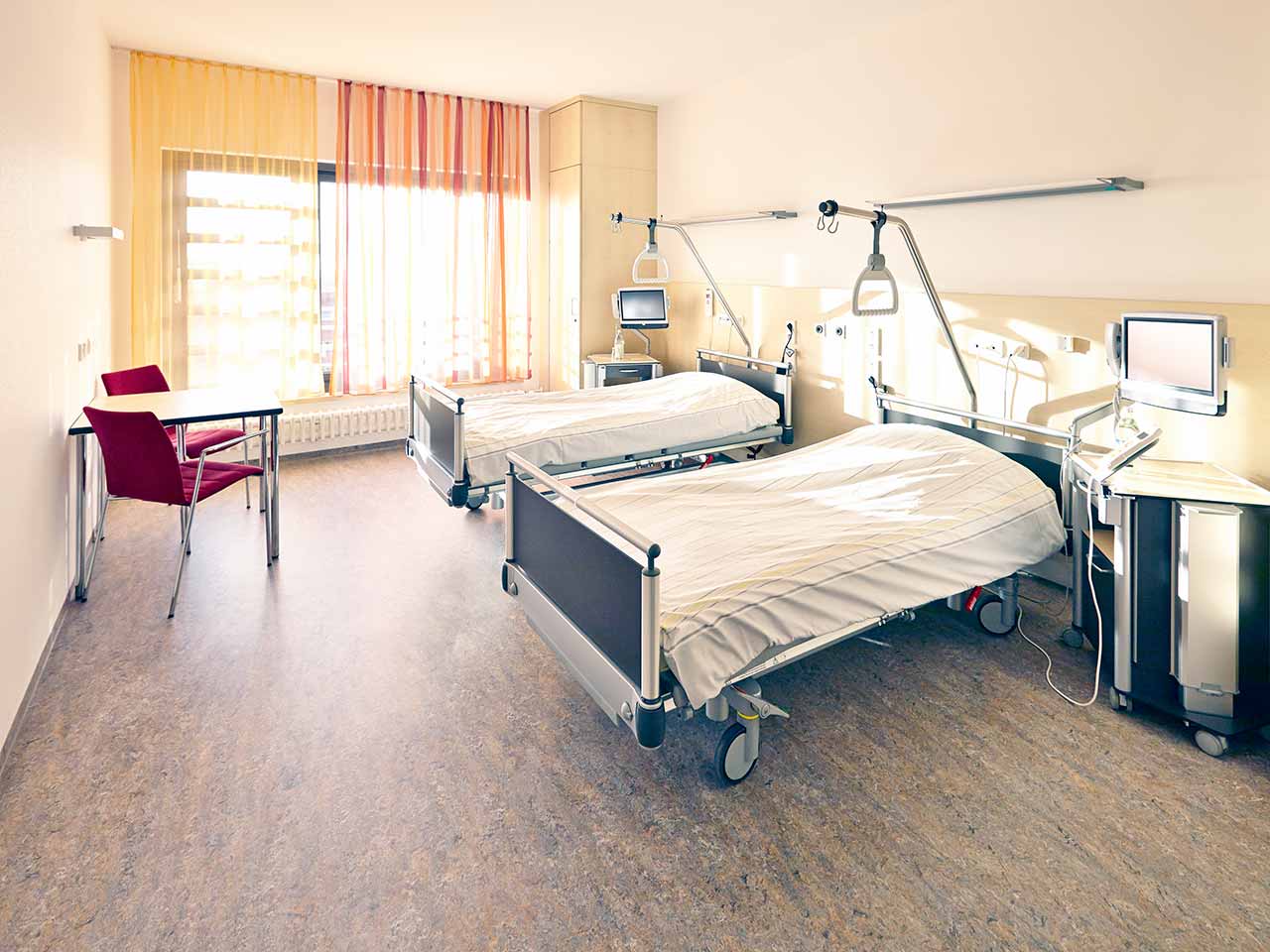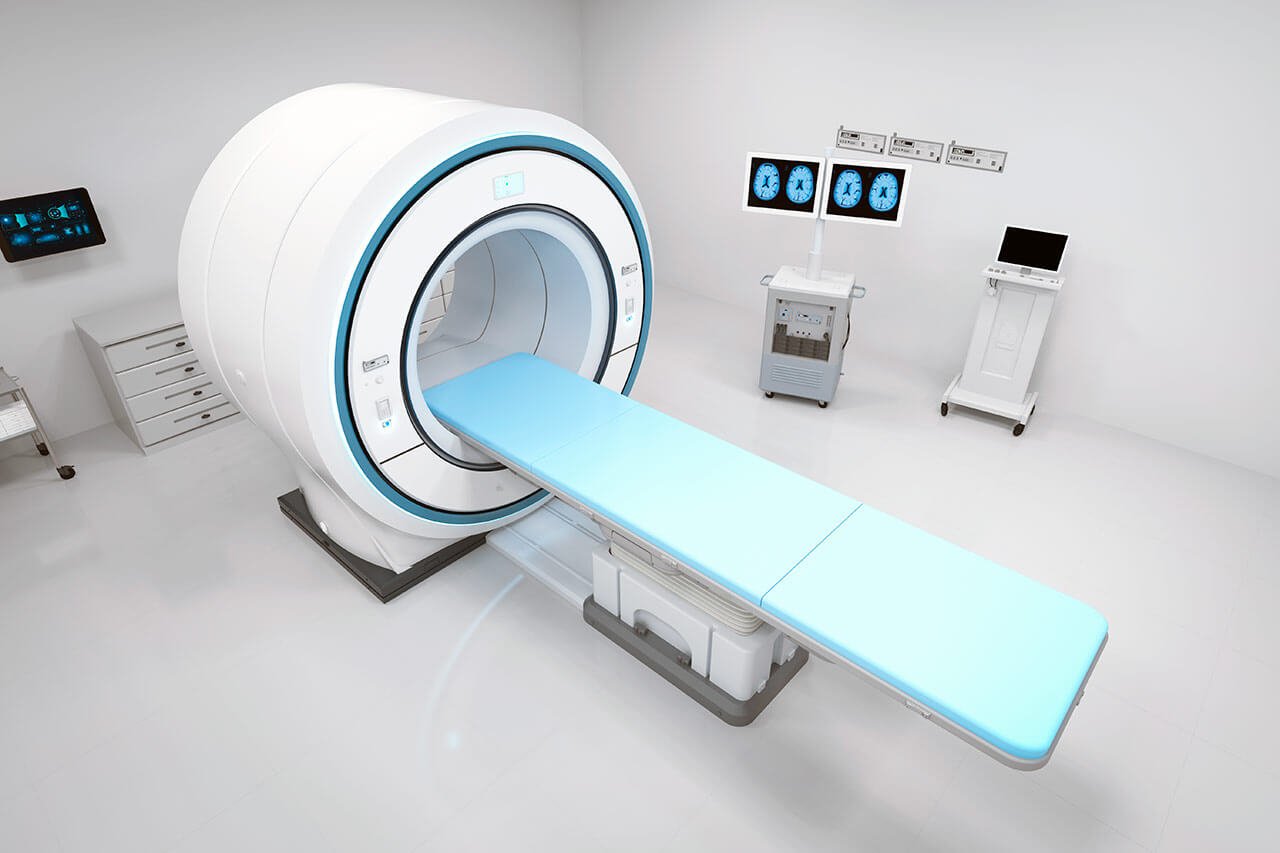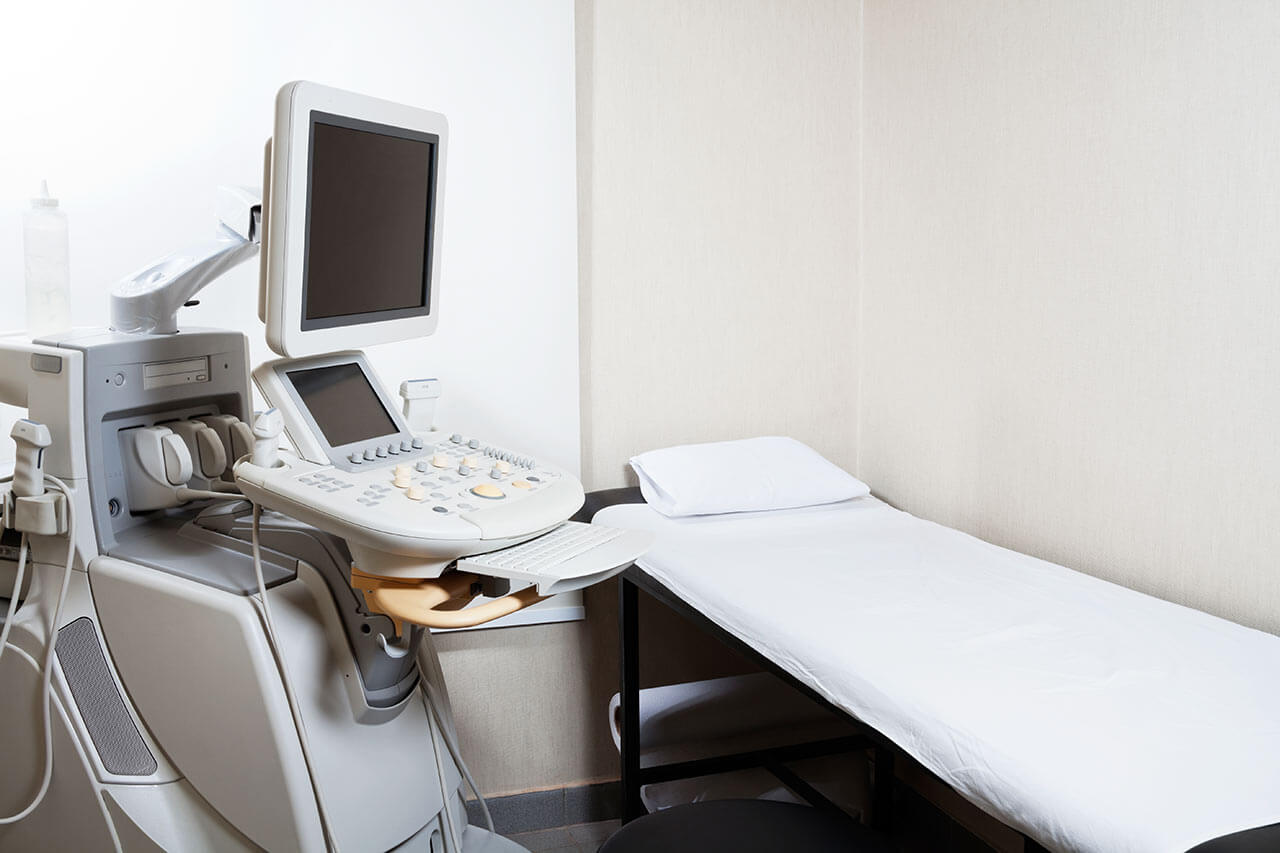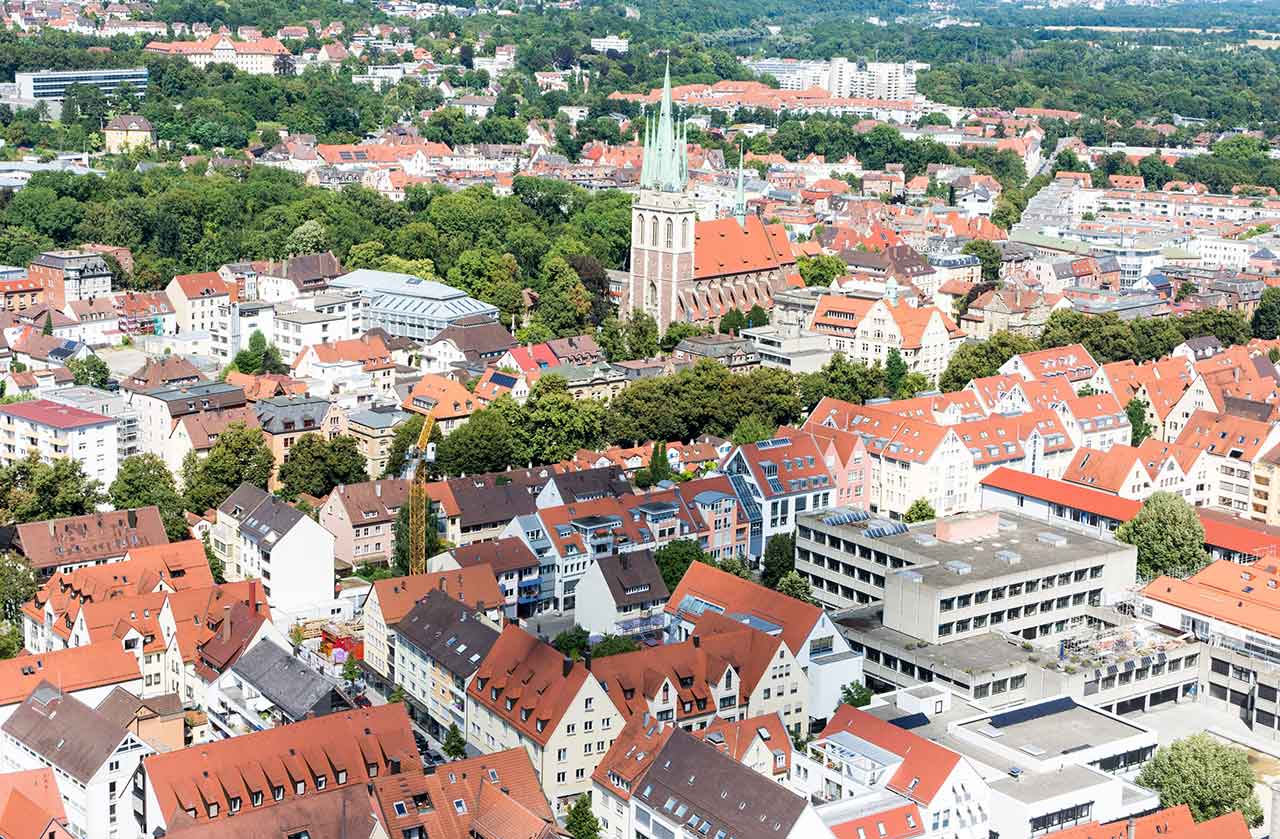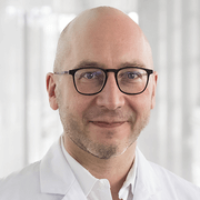
The program includes:
- Initial presentation in the hospital
- Clinical history taking
- Evaluating the available medical reports
- General clinical examination
- Urological examination
- Laboratory tests:
- Complete blood count
- Biochemical analysis of blood
- Inflammation indicators (CRP, ESR)
- Indicators of blood coagulation
- Tumor markers, PSA
- Ultrasound scan of the urogenital system
- CT scan/MRI of the abdomen and pelvis
- Preoperative care
- Removal of prostate tumor metastases with a gamma probe
- Consultations of related specialists
- Symptomatic treatment
- Cost of essential medicines
- Nursing services
- Control examinations
- Stay in the hospital with full board
- Accommodation in 2-bedded ward
- Recommendations regarding further treatment
Indications
- Confirmed prostate cancer with suspected metastasizing
How program is carried out
During the first visit, the physician will conduct a clinical examination and go through the results of the available examinations. After that, you will undergo the necessary additional examination, such as the assessment of liver and kidney function, ultrasound scan of the abdominal and pelvic organs. Based on the results, the physician will determine the number and localization of metastases, and plan the upcoming intervention.
On the eve of the intervention, you will receive an injection of radioactively labeled PSMA. PSMA is the substance that binds to the smallest prostate cancer metastases in the lymph nodes and other tissues. The radioactive label will allow the surgeon to find all the metastases during the operation.
Removal of prostate tumor metastases with a gamma probe starts with general anesthesia. After anesthesia, the surgeon makes small incisions through which he inserts endoscopic instruments, a gamma probe and a video camera into the pelvic cavity and abdominal cavity. The gamma probe detects the lymph nodes affected by metastases by a radioactive label, and the surgeon removes them endoscopically. The video camera continuously transmits a three-dimensional image of the operating field in 12-fold magnification to the monitor.
As the surgeon sees the operating field in multiple magnification, he preserves the nerve endings and large blood vessels. This significantly reduces the surgical risks. The gamma probe, in turn, allows detecting and removing all metastases, which minimizes the risk of prostate cancer recurrence.
After the completion of the operation, you will be transferred back to the ward, under the supervision of the attending physician and nursing staff. Due to the minimal invasiveness of the operation and the short duration of general anesthesia, you will not need to stay in the intensive care unit for a long time.
Finally, the attending physician will evaluate the results of control examinations, schedule the date of discharge from the hospital and give you detailed recommendations for further follow-up and treatment.
Required documents
- Medical records
- PSA blood test
- MRI/CT scan (not older than 3 months)
- Bone scintigraphy (if available)
- Biopsy results (if available)
Service
You may also book:
 BookingHealth Price from:
BookingHealth Price from:
About the department
The Department of Nuclear Medicine at the University Hospital Ulm offers the full range of medical services in this area. The department successfully performs both diagnostic and therapeutic procedures using radioactive agents. The diagnostic range of services includes PET/MRI, PET/CT, SPECT, SPECT/CT, and scintigraphy. The therapeutic offer includes radioiodine therapy, peptide receptor radionuclide therapy, Lutetium-177 PSMA therapy, selective internal radiation therapy (SIRT), and other innovative radionuclide treatments. Of particular interest to the department's specialists are the diagnostics and treatment of thyroid, heart, brain, and oncological diseases. The department is also actively engaged in productive research activities, thanks to which many innovative therapeutic methods are implemented in clinical practice. As one of the best and largest medical facilities of its kind in Germany, the department has its own modern cyclotron for the production of radioisotopes that are used during diagnostic and therapeutic procedures. The department is certified in accordance with DIN EN ISO 9001:2015 for providing top-class medical service in the area of its competence. In addition, the medical institution is certified by the German Cancer Society (DKG) for the treatment of various types of cancer. The department is headed by Prof. Dr. med. Ambros Johannes Beer.
One of the most popular treatment methods in the department is radioiodine therapy. This therapeutic method is successfully used in the department to fight thyroid cancer and hyperthyroidism. The essence of radioiodine therapy is as follows: the patient receives radioactive iodine (iodine-131) in the form of a capsule or in liquid form, after which the radiopharmaceutical enters the bloodstream; it is absorbed by atypical thyroid cells and begins to release radiation, causing their death. Treatment is usually carried out on an inpatient basis, with a hospital stay of 2-5 days (depending on the type of disease and the individual clinical situation). Radioiodine therapy is a safe treatment method, the effectiveness of which is comparable to surgery.
The medical facility also offers peptide receptor radionuclide therapy (PRRT) for the treatment of neuroendocrine tumors. There are receptors for somatostatin, a peptide hormone, on the surface of neuroendocrine tumor cells, so the department's specialists combine a somatostatin analogue with a radionuclide (Lutetium-177) to carry out PRRT. Thus, after intravenous injection, the radiopharmaceutical goes straight to the cancer focus. Upon reaching the target, the radioisotope begins to emit radiation that destroys cancer cells. Lutetium-177 emits high-energy beta particles, the radius of action of which is only a few millimeters, due to which a highly precise targeting effect on the tumor focus is achieved without damaging neighboring healthy tissues. Peptide receptor radionuclide therapy is well tolerated, causes virtually no side effects, and provides effective results. As a rule, the course of treatment with PRRT therapy consists of several cycles, which are carried out at intervals of several months.
The department's specialists have vast experience in Lutetium-177 PSMA therapy. This treatment method is indicated for patients with metastatic prostate cancer. PSMA is a type of protein that is found on the surface of prostate cells. In cases of prostate cancer, the concentration of this protein in cells increases hundreds of times. As the pathology metastasizes, PSMA is also detected in the affected organs and tissues. To perform PSMA therapy, the radioisotope Lutetium-177 is bound to the PSMA ligand and injected into the patient. The radiopharmaceutical binds to PSMA receptors and emits beta radiation, which gradually destroys cancer cells. The treatment is carried out on an inpatient basis, with a hospital stay of 2-3 days. This method demonstrates high efficiency, is well tolerated, and facilitates significant improvements in the patient's condition.
The department's range of medical services includes:
- Diagnostic options
- PET/CT
- PET/MRI
- SPECT
- SPECT/CT
- Scintigraphy
- Therapeutic options
- Radioiodine therapy
- Peptide receptor radionuclide therapy
- Lutetium-177 PSMA therapy
- Selective internal radiation therapy (SIRT)
- Ra-223 therapy (Xofigo®)
- Radioimmunotherapy with 90Y-labeled anti-CD66 antibody
- Other diagnostic and treatment methods
Curriculum vitae
Higher Education and Professional Career
- 1992 - 1999 Medical studies, Ludwig Maximilian University of Munich.
- 1999 Thesis defense, Institute of Radiation Biology, Ludwig Maximilian University of Munich.
- 2001 Admission to medical practice.
- 1999 - 2001 Assistant Physician, Institute of Diagnostic and Interventional Radiology, University Hospital Rechts der Isar Munich.
- 2001 Consultant for computed tomography, Siemens Medical Solutions.
- 2001 - 2003 Assistant Physician, Institute of Diagnostic and Interventional Radiology, University Hospital Rechts der Isar Munich.
- 2003 - 2004 Assistant Physician, Department of Nuclear Medicine, University Hospital Rechts der Isar Munich.
- 2004 - 2006 Assistant Physician, Institute of Diagnostic and Interventional Radiology, University Hospital Rechts der Isar Munich.
- 2006 - 2009 Assistant Physician, Department of Nuclear Medicine, University Hospital Rechts der Isar Munich.
- 2006 Board certification in Radiology.
- 2007 Habilitation in Nuclear Medicine.
- 2009 Board certification in Nuclear Medicine.
- 2009 - 2014 Senior Physician, Department of Nuclear Medicine, University Hospital Rechts der Isar Munich.
- 2014 Extraordinary Professorship for Nuclear Medicine.
- Since 2014 Professor and Head Physician of the Department of Nuclear Medicine at the University Hospital Ulm.
Prizes, Awards, and Honors
- 2004 "Image of the Year", Annual Conference of the German Society of Nuclear Medicine (DGN), Rostock.
- 2005 Young Investigator Award from the Society of Nuclear Medicine at the Technical University of Munich.
- 2005 First place in the nomination "Outstanding Clinical Trials" in the Journal of Nuclear Medicine, Annual Meeting of the Society of Nuclear Medicine (SNM), San Diego.
- 2007 Best Clinical Document (3rd Place) of the Young Specialists Committee of the Society of Nuclear Medicine, Annual Meeting of the Society of Nuclear Medicine (SNM), Washington DC.
- 2008 First Place, "International Symposium on Cardiovascular Disease Research", Annual Meeting of the Society of Nuclear Medicine (SNM), New Orleans.
- 2008 Honorary Award from the Bavarian Radiological Society, "Imaging of the human antigen-specific cytotoxic T-lymphocytes marked with the superparamagnetic iron oxide particles".
- 2008 Honorary Award from the Bavarian Radiological Society, "Magnetic resonance imaging in patients with rectal cancer before neoadjuvant chemotherapy for the prediction of low-risk circular resection and survival rate improvement".
- 2009 Molecular Imaging Travel Award for Publication, Annual Meeting of the Radiological Society of North America (RSNA), Chicago.
- 2010 Center of Excellence for Molecular Imaging, Young Researcher Award (2nd place), Annual Meeting of the Society of Nuclear Medicine (SNM), Salt Lake City.
Memberships in Professional Societies
- Society of Southwest Germany Radiologists and Nuclear Medicine Specialists (President).
- German Society of Nuclear Medicine (DGN).
- European Association of Nuclear Medicine (EANM).
- German Radiological Society (DRG).
- Society of Nuclear Medicine (SNM).
- Radiological Society of North America (RSNA).
Photo of the doctor: (c) Universitätsklinikum Ulm
About hospital
The University Hospital Ulm is an advanced medical complex that provides patients with high-class medical care using the very latest scientific achievements. The medical facility has been performing successful clinical activities for more than 40 years and has long earned an excellent reputation throughout Europe. The hospital regularly demonstrates high treatment success rates, takes an active part in the training of medical students, and works tirelessly on promising research projects.
The university hospital consists of 29 specialized departments and 16 scientific institutes, where more than 7,000 highly qualified employees work for the benefit of their patients. More than 55,000 inpatients and about 300,000 outpatients are treated here every year. The hospital has 1,274 beds. The medical team of the hospital is focused on providing personalized medical services using the most modern and sparing diagnostic and treatment methods.
The University Hospital Ulm is the largest medical complex in the region, and practically all areas of modern medicine are represented here. Transplantology and oncology are among the priority areas of clinical activity in the medical facility. The hospital holds leading positions in the world in bone marrow transplantation. In addition, the hospital has advanced experience in cancer treatment. The Comprehensive Cancer Center is recognized as the leading facility of this kind in the country, and it is certified by the German Cancer Society (DKG). It provides effective treatment for various types of cancer. The center also offers innovative CAR T-cell therapy. In addition, the Cancer Center is actively engaged in research activities to improve available treatment methods and develop innovative therapeutic techniques to fight cancer.
Along with the use of advanced technologies, doctors show respect, understanding, and a humane attitude toward the patient. The medical team includes competent psychologists, who are always ready to provide assistance and support to the patients and their families during the therapeutic process.
Photo: (с) depositphotos
Accommodation in hospital
Patients rooms
The patients of the University Hospital Ulm live in comfortable single and double rooms with a modern design and light colors. All patient rooms have an ensuite bathroom with a toilet and a shower. The patient room furnishings include a comfortable automatically adjustable bed, a bedside table, a wardrobe, a table and chairs, a telephone, a radio, and a TV. Wi-Fi access is also available in patient rooms.
The hospital also offers enhanced-comfort rooms, which additionally have a safe, a refrigerator, and upholstered furniture. The bathroom in the enhanced-comfort room has changeable towels, a cosmetic mirror, a hairdryer, and toiletries.
Meals and Menus
Patients and their accompanying person are offered three meals a day: breakfast, lunch, and dinner. The patient and accompanying person have a choice of three menus every day, including a vegetarian menu. Patients staying in the enhanced-comfort rooms are also offered light snacks, fruits, desserts, and hot and cold drinks in the comfortable lounge area.
If, for some reason, you do not eat all the foods, you will be offered an individual menu. Please inform the medical staff about your dietary preferences prior to treatment.
Further details
Standard rooms include:
![]() Shower
Shower
![]() Toilet
Toilet
![]() Wi-Fi
Wi-Fi
![]() TV
TV
Religion
The hospital has a chapel where Catholic and Protestant services are held weekly. The services are also broadcast on the internal television channel of the hospital. The chapel is open 24 hours a day for visits and prayers.
The services of other religious representatives are available upon request.
Accompanying person
Your accompanying person may stay with you in your patient room or at the hotel of your choice during the inpatient program.
Hotel
You may stay at the hotel of your choice during the outpatient program. Our managers will support you for selecting the best option.
